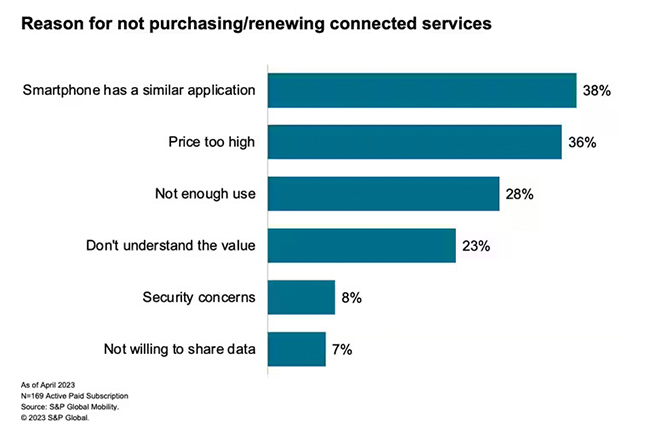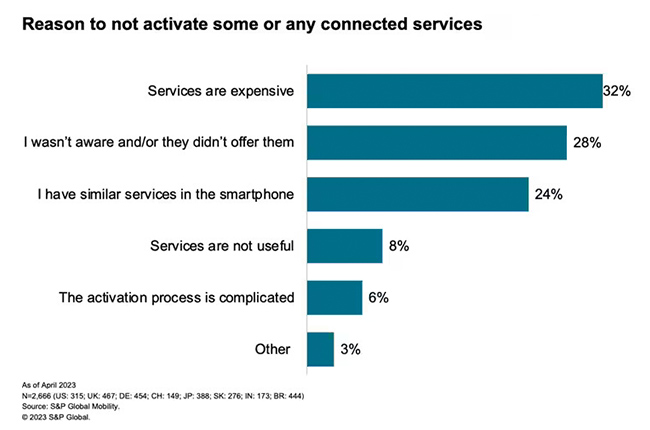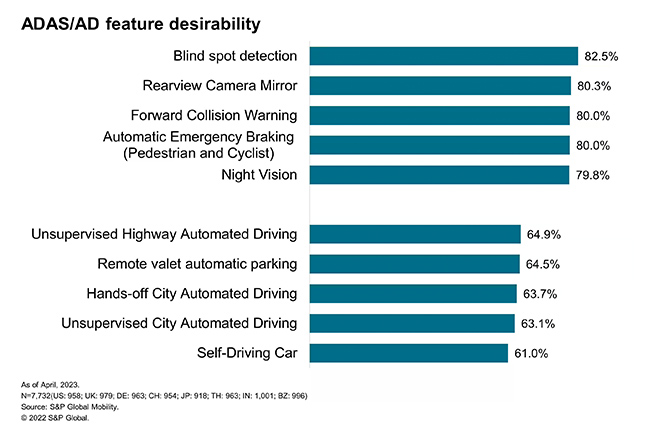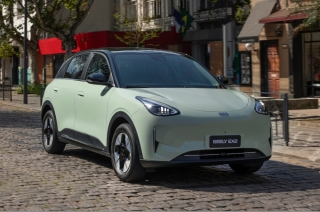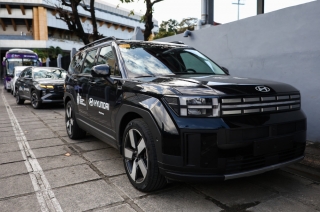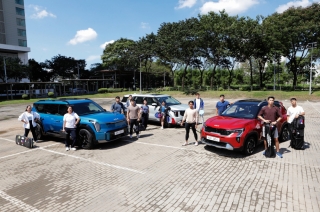
S&P Global Mobility is a company that delves into the business of providing insight and market forecasts among others in the automotive industry. This time, their study tackles a hotly debated issue surrounding paid subscription services in cars. The thrust of their study is to simply answer if people are willing to pay for in-car subscriptions.
What do customers think of subscription services?
Before we dive too deep into the topic, the survey revealed that consumers are indeed open to paying for connected-car services. However, their willingness to do so is contingent on the services providing tangible value or being accessible through a free trial. Conversely, consumers are less enthusiastic about features they have no intention of using or already have access to on their smartphones, which is to be expected.
BMW and Mercedes-Benz, among other automakers, encountered criticism when they introduced subscription-based products and services in their vehicles. BMW specifically got into hot water because it intended to sell heated seats and steering wheels as a subscription service, a feature that can be bought along with the car. S&P Global Mobility’s survey indicates that the concern might have been blown out of proportion though. It appears that only a minority of survey respondents, less than 30 percent, are inclined to pay for heated seats or a heated steering wheel through a monthly subscription. In terms of value, these features are reasonably affordable to purchase outright, which lessens the necessity of spreading the costs over a subscription model.
What services are customers willing to put down money on?

This brings us to what consumers do want for a subscription service. If the BMW heated seats and steering wheel fiasco is anything to go by, it’s that consumers don’t want to pay a subscription for a feature that can already be had with the car. They want the paid feature to add value to the ownership of their vehicle. As per the findings of the S&P Global Mobility survey, consumers display a positive inclination towards subscriptions that provide access to innovative features and technologies. Notably, when presented with free trials or existing subscriptions for newer vehicles, an impressive 82 percent of the survey respondents expressed their willingness to contemplate the purchase of subscription-based services for their future new-vehicle acquisitions. NissanConnect is a subscription that comes to mind when it comes to services that are offered with a free trial period. In addition, Nissan Connect and FordPass offer functions that can only be used with their app, meaning there is no replacement for what it provides anywhere else.

Speaking of the term “value” once again, the survey revealed the significance of providing value-added services within subscriptions. Particularly, paid functional upgrades, such as improved navigation and advanced driver-assist system (ADAS) functionality, garnered significant interest among consumers. Safety features like high-beam assist and driving video recorder received the highest satisfaction ratings among the connected services offered. On the other hand, features like heated seats or remote start generated less interest, mainly because consumers are accustomed to paying for these as part of an options package.
How about privacy and security?
Now that we know where customers would much rather put their money, how about security? Paid subscriptions like Netflix or Amazon Prime ask for a ton of personal information from customers and it will be the same for its in-car counterpart. In the survey, it was revealed that although consumers harbor concerns regarding data privacy, an encouraging 74 percent of respondents expressed their willingness to share data in exchange for free services. Also, quite surprisingly, the survey indicated that consumers tend to place more trust in automakers compared to technology companies like Google or Meta when it comes to handling their data.
Performance behind a paywall?
The survey conducted by S&P Global Mobility revealed where consumers stand on in-car subscriptions - what they want and what they don’t. What the survey doesn’t reveal is if customers are open to paying for more performance out of their vehicle. Mercedes-Benz is said to be putting a performance upgrade to its EQE and EQS EVs which can be obtained with a yearly subscription. How this “upgrade” will be treated by the general public is still unknown, surely a topic to study for next time.
Latest News
-
Geely’s EX2 EV headed to Australia — is a Philippine launch possible? / News
The Geely EX2 is confirmed to go on sale in Australia in 2026. Could a launch in the Philippines also be on the cards?
-
Hyundai Motor Philippines is the FIFA Futsal Women's Teams' official mobility partner / News
Hyundai Motor Philippines strengthened its partnership with FIFA through its support of the FIFA Futsal Women's Teams.
-
Kia Philippines backs EJ Obiena as Atletang Ayala continues championing Filipino athletes / News
Kia Philippines strengthens its support for EJ Obiena, backing the Olympian with dedicated mobility at home and abroad.
Popular Articles
-
Electric Vehicles in the Philippines for under P1 million
Jerome Tresvalles · Aug 19, 2025
-
Top 3 Cars For Every Lifestyle—What Cars Are Right For You? | Behind a Desk
Caco Tirona · Apr 24, 2024
-
5 Tips to Maximize Fuel Efficiency
Jerome Tresvalles · Sep 09, 2024
-
Five driving habits that are draining your fuel tank
Jerome Tresvalles · Jun 24, 2025
-
Can engine braking harm your engine?
Jerome Tresvalles · Sep 11, 2025
-
Do electric cars even need maintenance?
Jerome Tresvalles · Oct 23, 2024
-
Best vehicles for an active outdoor lifestyle
Shaynah Miranda · Jul 25, 2024
-
How to drive different types of vehicle transmissions
May 23, 2024
-
5 easy ways to keep your car interior clean
Allysa Mae Zulueta · Nov 15, 2021
-
How to survive Metro Manila traffic
Earl Lee · Aug 16, 2022


